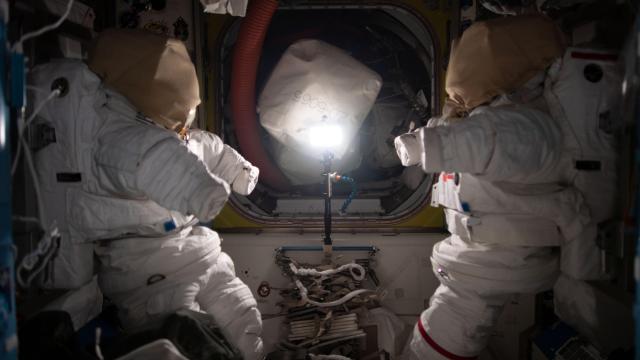The brains of astronauts hanging out in microgravity environments start to change over time and need at least three years to reset, new research suggests.
A group of researchers studied the brain scans of 30 astronauts after their trips to space and found that the brain ventricles expanded significantly for those who had spent six months or longer on board the International Space Station (ISS). The study, published Thursday in Scientific Reports, suggests that astronauts should spend three years on Earth between their missions to allow their brains to recover.
Ventricles are a network of cavities filled with cerebrospinal fluid that cushion the brain, while also nourishing and protecting it. Without gravity, the fluid starts to shift upwards, pushing the brain higher up against the skull and expanding the ventricles, according to the study.
The more time astronauts spent in space, the bigger the effect on their brains. Out of the 30 astronauts whose brains were studied, eight had gone on two-week missions while 18 had been on six-month-long missions and four were in space for around one year. The brain scans showed no measurable change in the ventricles for astronauts who spent only two weeks in space.
“We found that the more time people spent in space, the larger their ventricles became,” Rachael Seidler, a professor of applied physiology and kinesiology at the University of Florida and author of the new study, said in a statement.
Space can take a serious toll on the body. In 2005, NASA Astronaut John Phillips reported that his vision had changed following a six-month-long mission on board the ISS. Phillips wasn’t the only one; a series of follow-up tests revealed that most astronauts suffered similar changes to their eyesight. Previous research has also shown that long-duration spaceflight may fundamentally alter the amount of cerebrospinal fluid in the brain, with the increased volume of fluid remaining for a full year after astronauts returned from space.
The list doesn’t stop there. As other research shows, long duration spaceflight can result in the loss of bone density and the onset of muscle atrophy, in addition to detrimental effects on the heart, eyes, spine, cells, and overall physical fitness. Returning to brain health, research from 2017 showed that extended stints in space caused grey matter to both increase and decrease in different regions of the brain, which is likely not good; grey matter plays a major role in many essential functions, including muscle control, the processing of emotions, the storage of memories, and the interpretation of sensory perception.
All that said, there still isn’t that much known on the full extent of the effects of spaceflight on the human body given that there are only a few subjects that have actually spent time in space. As NASA and other space agencies begin to set goals of establishing a sustainable human presence on the Moon, and perhaps even Mars, this type of research is now more crucial than ever.
“We don’t yet know for sure what the long-term consequences of this [brain ventricle expansion] is on the health and behavioural health of space travellers,” Seidler said.
The study does show, however, that the expansion of the brain ventricles tapered off after the six-month mark. “We were happy to see that the changes don’t increase exponentially, considering we will eventually have people in space for longer periods,” she added.
The main takeaway for the recent study is that astronauts need some recovery time on Earth before they can venture back out to space again, allowing at least three years for their brain ventricles to return to normal. “Allowing the brain time to recover seems like a good idea,” Seidler said.
